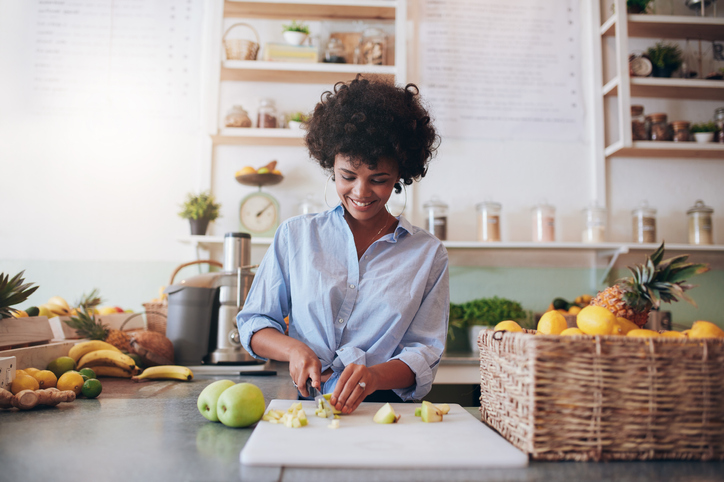From hormones to heart health, we’ve rounded up the best expert advice you and your family need to stay in top health this month
We humans, as much as we like to think we’re adaptable, love nothing more than a solid routine. So, when we went into lockdown in March, many of us found that we had to completely reset our lives. Gone was the commute, and out were evening social and weekend plans. Instead, we enjoyed baking banana bread, sourdough tutorials and oh-so-many Zoom quizzes and calls. But now that things are (sort of) back to normal, what happens to our new routine? Perhaps not having to commute to work gave you the opportunity to work out in the morning, or being on furlough allowed you to take up a creative pursuit. For changes such as these to become habits, data shows that you must keep them up for two months (66 days to be exact, according to research by the University College of London). To help you stay on track and adjust smoothly to your new normal, follow our plan on how to sync your body to your routine and make it all work for you.
Step 1: Simplify your slumber
Sleep, eat, repeat. Before you start setting lofty goals for your back-to-normal lifestyle, it’s crucial to get the basics right. “With COVID-19, it’s more important than ever to get a good night’s rest because of the link between our sleep and our immunity,” says Dr Micheal Mosley. “We know that, during deep sleep, our body makes a type of protein that targets viral infections, and not getting enough shut-eye suppresses infection-fighting antibodies.” The best way to ensure a peaceful night’s slumber? Ditch the habits that aren’t serving you, as nutritional therapist Clare Barnes (bio-kult.com) explains: “My recommendations for a good night’s sleep are: don’t drink caffeine past midday; swap any nighttime tipples for a cup of chamomile tea or valerian tea (alcohol may send you off to the land of slumber quickly but it will probably lead to poor quality sleep); and try to avoid eating a big meal before bed – this allows the digestive system time to break down food components before you lay down.” Speaking of food, now is the best time to make sure your diet is at its optimum for your return back into the world, too.
Step 2: Hone your diet
“As many of us start re-entering the workplace, there’s no doubt that energy levels will be taking a hit and adjustments will have to be made,” says dietitian Jane Clarke (nourishbyjaneclarke.com). “Swap any white carbohydrates that you regularly eat for lighter or wholemeal ones. For example, you could try cauliflower rice instead of the white rice; courgetti instead of spaghetti; or butternut sheets instead of lasagne. Also, try having complex carbohydrates such as sweet potatoes, porridge oats and wholegrains. These are processed by the body much more slowly than their refined counterparts, such as white bread and pasta, which means they release their energy gradually and help you to avoid that inevitable 4pm sugar crash. Remember to keep guzzling water, too – when you hit the 2.5 litres-a-day mark, your energy levels will be more consistent. It sounds like a lot but, if you stagger it throughout the day, it can help to keep your energy levels up and boost your mood.”
Step 3: Be workout wise
Whether it’s that we crave more alone time than our Friday night plans would have led us to believe, or that the ritual of making dinner is an important way of winding down, many of us have discovered something new about ourselves during the lockdown period. So, it’s important that we continue to indulge in the home life habits that we’ve grown to love. “Try integrating your new habits into your old routine,” says Chiara Becuti, Pilates instructor (flyldn.co.uk). “Be realistic about what will be achievable and sustainable, then start looking at your schedule and, like a puzzle, insert the new pieces of it into the old picture. For example, if you enjoyed cycling and baking during lockdown, why not try to bike to work and set aside time on a Sunday to bake healthy snacks for your work week ahead?” Want to try to keep a new workout routine? Take your virtual classes with you to the office. “Now that we all know training from home is possible, try bringing your gym kit with you to work or leave your kit at your workplace so you can exercise when you want to. If you enjoyed a lunchtime class during lockdown, there’s no need to change the habit. There are so many online classes that you can fit around your work schedule and, if you are lucky enough to have a space for it around you, such as a park, there really is no excuse!”
Step 4: Take it easy
With the world slowly getting back to normal, you may feel a pressure to engage with everything straightaway. However, there is no need to rush, as doing everything at once may leave you feeling overwhelmed. “Ease yourself back into your normal schedule and plan out your activities so you only have a couple per week, leaving time to relax and recuperate between each ‘new’ experience,” advises psychotherapist Gosia Bowling (nuffieldhealth.com). “This may mean scheduling the first time that you commute back into work (or meet up with friends). Planning can be helpful. If you’re nervous about your first commute or trip to the gym, it can help you feel more in control of the situation. Feeling prepared should help you to feel reassured as you adjust back into your normal routine.”
Communication with your loved ones is also important as you start to reemerge into the world again. “When a thought or feeling arises, acknowledge it and put words to your experience (for example, “I am feeling a little anxious”) then take a moment at the end of each day to reflect on the things that made you feel better. Write down the ‘pressure points’ which made you feel stressed and take some time to prepare yourself before a social situation or journey.” We have a concept in our society that being busy is optimal, but balance is needed and meditation and reflection can help with this. Being busy takes us out of the present, so ask yourself: Are you more present now? Are you happier? If so, stick with it. We don’t need to rush as we once did.






















